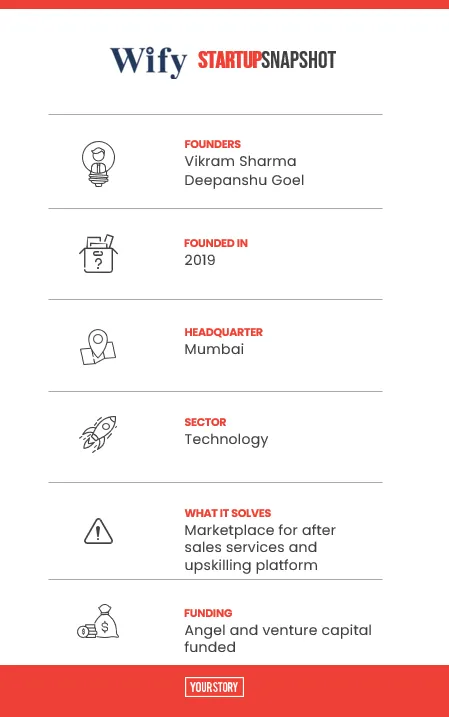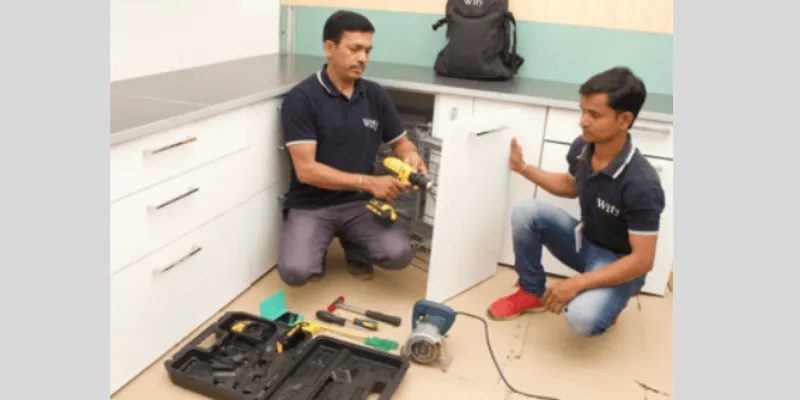How this startup is upskilling blue-collar professionals to work with brands
Mumbai-headquartered tech startup Wify brings together brands and blue-collar professionals on a single platform to provide optimum post-sale services to customers.
As a serial entrepreneur, Vikram Sharma has always believed in making a difference in people’s lives, especially blue-collar workers.
Studies reveal that India is home to over 350 million blue-collar workers, but many of them are under-employed or underpaid due to the lack of adequate skills.
This is why Vikram, along with Deepanshu Goel, started in July 2019 to upskill and uplift the living standards of these skilled professionals.
The Mumbai-headquartered tech startup aims to enable blue-collar skilled personnel to earn a steady or higher income, as well as ensure brands can fulfil the requirements of customers.
“We want to be the number one trusted platform providing post-purchase services for brands,” says Vikram in conversation with YourStory.

Brand partnerships
Towards this end, Wify has partnered with over 200 brands like Ikea, Amazon, Homelane, and Livspace, and provides them with after-sale services which include installation and anything else which is covered under the warranty period.
Given the breadth and range of products available to consumers, Wify narrowed down their services to the home improvement segment, which include categories such as furniture fittings, smart homes, modular flooring, appliances, and doors and windows.
According to Vikram, the segment faces three broad challenges:
- Technology around these products has dramatically changed.
- Online shopping has taken the products beyond Tier-I cities
- Brands find it difficult to provide after-sale services.
“The services provided by Wify is helping the consumers, brands and the blue-collar professionals,” says Vikram.
Jobs platform
Given such a scenario, Wify has created an online platform where it brings together skilled professionals and provides them with job opportunities using their existing partnerships with brands. It enables blue-collar professionals to apply for jobs.
The startup also focuses on equipping blue-collar professionals to discharge their functions.
“There has to be a deep alignment of skilling, which include both hard and soft skills, for career progression. Our uniqueness is that we help people upgrade their skills,” says Vikram.
Under the Wify model, before joining the startup, interested seekers will have to pass the test to check their skill level and suitability. Post that, they are imparted with the much-needed soft skills like being punctual, commitment to deadlines, and various other nuances on what it takes to be successful.
“Every week, we provide them with content on the required soft skills and it is a continuous process,” says Vikram.
Upskilling
But not just that, they are also trained on the products.
Vikram says there are numerous products in the market today where the blue-collar workers may not have the necessary skills. “I tell them: if you do not learn about Ikea products, there are chances that you will be unemployable,” he remarks.
In the home improvement category, there has been significant adoption of technology. For example, a simple kitchen cabinet of the past consisted of wood and gum, but now it is more hi-tech, and installation of such products require learning new skills.
During his constant interaction with blue-collar professionals, Vikram saw their aspirations to become entrepreneurs that were bogged down by three concerns: uncertainty about a steady source of business, lack of capital, and absence of upskilling opportunities.
“We take care of all these requirements and at our backend, we are constantly providing the skilling opportunities to these professionals where they do not have to pay,” says Vikram.
Business growth
Today, Wify has around 1,000 blue-collar professionals on its platform, with 300 of them being full-time employees.
This startup has a current annual revenue rate of Rs 15 crore. It has a presence in 40 cities and provides services to more than 10,000 homes every month.
Wify engages through long-term contracts with brands where it provides the standard price list for the various services, and on the other hand, blue-collar professionals have their own pricing list. The difference between these two is what the startup earns.
Vikram claims the startup has a gross margin of around 30-40 percent, and it is already profitable.
“Our customer acquisition cost is zero and the average transaction value on our platform is Rs 5,000,” says Vikram.
Future plans
Planning ahead, Wify is looking to enter into more segments of the home improvement category such as plumbing, electrical etc. Also, the startup aims to enter the commercial business segment.
At the same time, it has also opened an avenue for customers to reach out to them directly, especially when the warranty period for the products is over. It already generates 5 percent of its revenues through this route.
Vikram says, “We will go after the direct to consumer segment but in a capital-efficient manner. Today our revenue exceeds the capital that we have raised.”
Wify, on average, generates about a Rs 1 crore revenue per month.
Wify has raised around $2 million in funding through angel investors and venture capital firms. It aims to raise further rounds to cover more locations across the country as around 90 percent of its business comes from Tier-I cities.

Image credit: Wify website
Wify competes with both organised and unorganised sectors. It also competes with Urban Company, which provides similar services as well some other localised startups like Pingkaro.
The COVID-19 induced lockdowns gave a boost to Wify’s business prospects due to increased online purchases and brands being unable to meet customers’ post-sales requirements.
While the startup faced challenges in terms of hiring professionals during the initial period of the lockdown, Vikram says it provided sustainable incomes and other necessities which have generated enough goodwill for the startup.
The biggest challenge that Wify currently faces is in imparting soft skills training to blue-collar professionals.
Vikram says, “For us, the big challenge is to change the mindset of these people as they have a certain imprint because of their past experience.”
Edited by Kanishk Singh









